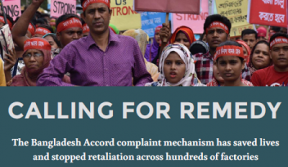ILRF lauds the US Government’s decision today to suspend Bangladesh from the Generalized System of Preferences trade program. The decision was made in response to a petition filed by the AFL-CIO more than five years ago calling for action by the Bangladesh government to end labor abuses in the garment and shrimp industries. The decision by the Obama Administration to suspend benefits comes on the heels of the Rana Plaza building collapse, which killed over 1,100 garment workers.
“The Obama Administration took an important step today in support of Bangladeshi workers’ right to stand up to their managers and industry executives and demand safe, decent jobs,” said Brian Campbell, Director of Policy and Legal Programs at the International Labor Rights Forum. “The Government of Bangladesh all but forced this decision failing to take any meaningful steps to end rampant abuses in the garment industry over the past five years. Instead, the Government and garment industry spent lavishly on lobbying Washington for even more industry tax breaks while hundreds of Bangladeshi garment workers died in unsafe factories and labor rights advocate Aminul Islam was murdered allegedly by Bangladesh Government security forces.”
The overall economic impact of the decision to suspend GSP will be minimal and will result in increased tariffs on only 0.72 percent of all imports from Bangladesh. However, it does send a strong message to the Bangladesh Government, factory owners, and global brands and retailers that they must take serious action to end the widespread labor abuses and protect workers’ right to organize.
“While the decision is an important step by the US Government, the decision alone may not ensure that action will be taken to end the epidemic of senseless deaths of Bangladesh’s garment workers,” said Liana Foxvog, Director of Organizing at the International Labor Rights Forum. “As a next step we ask the US Government to call on US companies like Gap and Walmart to make legally-binding commitments to invest in the future of Bangladesh garment workers by joining the Safety Accord.”
The Accord on Fire and Building Safety in Bangladesh is an historic agreement between apparel brands and retailers and international and Bangladeshi unions under which the companies make a binding commitment to ensure garment workers’ safety. The Accord requires signatory companies to help finance renovations to make factories safe and establishes a vital role for workers and their unions in the implementation and review of safety programs. So far, 63 apparel companies from a dozen countries have committed to the Accord. Last week 113 organizations sent a letter to US Secretary of State John Kerry urging the US Government to support the Accord. On Saturday, June 29, protests are planned in thirty cities as part of the International Day of Action to End Deathtraps. The actions will call on Gap, Walmart and other major retailers to sign onto the Accord.
Though the economic impact of GSP suspension is minimal overall, public health advocates joined with labor advocates today in welcoming the US Trade Representative’s decision to suspend GSP benefits for labor rights violations, citing long-term economic and health benefits for both Americans and Bangladeshis as a result of an end to the tax breaks that have largely benefited the tobacco industry.
“We applaud the US Government for taking this important step that we hope will open needed engagement with Bangladesh to end labor abuses and move Bangladesh on the path toward a sustainable economic future with good jobs and without tobacco, which is the world's leading cause of preventable death with staggering social and economic costs as a result,” said Marty Otanez, board member of the Human Rights and Tobacco Control Network.
In 2012, the tobacco industry was the largest beneficiary of Bangladesh’s GSP program, accounting for over $11 million in tobacco exports out of $35 million in total GSP exports. Tobacco exports under the GSP program have more than doubled over the past two years, which is the result of a rapidly expanding tobacco sector. From 2006 to 2010, the acreage on which tobacco was cultivated in Bangladesh increased by 141 percent.

